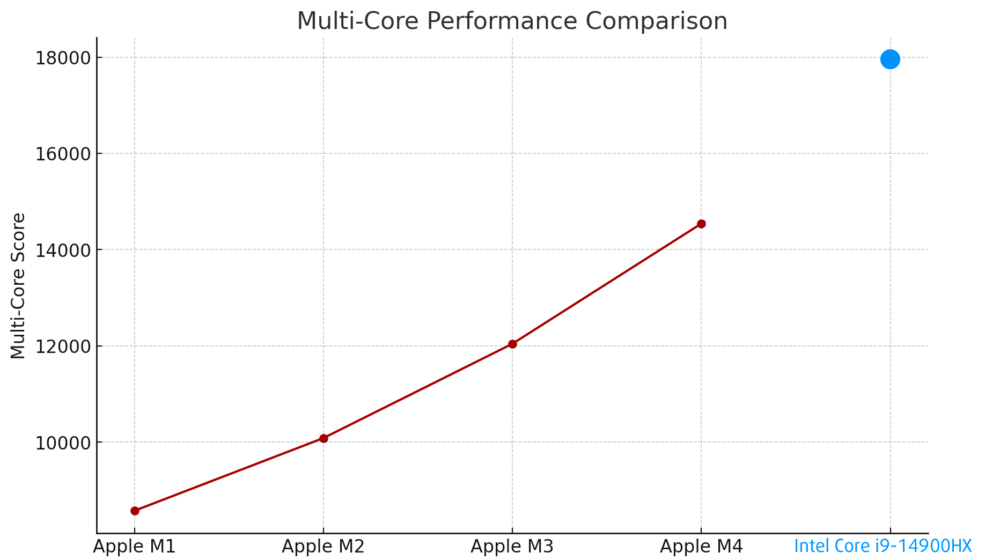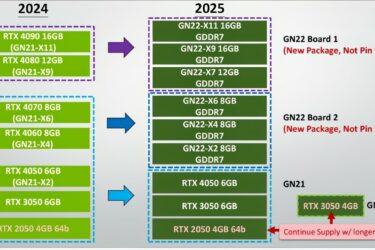Apple M4 vs M3 (+ Pro / Max) vs M2 (+ Pro / Max / Ultra) vs M1 (+ Pro / Max / Ultra) – The Ultimate Benchmark Comparison!
Apple has ingeniously designed its M-series CPUs to function like legos, allowing them to pair up and create more formidable chips. For instance, the M-Ultra chips are essentially two M-Max CPUs combined, effectively doubling their resources to challenge every Intel and AMD CPU. However, today’s focus isn’t on Team Blue and Team Red; instead, we’re comparing all four generations of M-series processors.
Additionally, we’ll provide projected scores for the M4 Pro, M4 Max, and M4 Ultra processors. Let’s go!
Apple CPU lineup – The Full List
Each new generation of Apple chips brings significant upgrades, as Apple introduces more powerful and efficient architectures annually:
| Apple SoC | Performance / Efficiency Cores | GPU Cores | Memory Bandwidth | Transistors |
| Apple M4 (10-core CPU) | 4P+6E | 10 | 120 GB/s | 28 billion |
| Apple M3 Max (16-core CPU) | 12P+4E | 30 or 40 | 408.6 GB/s | 92 billion |
| Apple M3 Max (14-core CPU) | 10P+4E | 30 or 40 | 307.2 GB/s | 92 billion |
| Apple M3 Pro (12-core CPU) | 6P+6E | 14 or 16 | 153.6 GB/s | 37 billion |
| Apple M3 Pro (11-core CPU) | 5P+6E | 14 or 16 | 153.6 GB/s | 37 billion |
| Apple M3 (8-core CPU) | 4P+4E | 8 or 10 | 102.4 GB/s | 25 billion |
| Apple M2 Ultra (24-core CPU) | 16P+8E | 60 or 76 | 819.2 GB/s | 134 billion |
| Apple M2 Max (12-core CPU) | 8P+4E | 30 or 38 | 409.6 GB/s | 67 billion |
| Apple M2 Pro (12-core CPU) | 6P+4E | 16 or 19 | 204.8 GB/s | 40 billion |
| Apple M2 Pro (10-core CPU) | 6P+4E | 16 or 19 | 204.8 GB/s | 40 billion |
| Apple M2 (8-core CPU) | 4P+4E | 8 or 10 | 102.4 GB/s | 20 billion |
| Apple M1 Ultra (20-core CPU) | 16P+4E | 64 | 819.2 GB/s | 114 billion |
| Apple M1 Max (10-core CPU) | 8P+2E | 24 or 32 | 409.6 GB/s | 57 billion |
| Apple M1 Pro (10-core CPU) | 8P+2E | 16 | 204.8 GB/s | 33.7 billion |
| Apple M1 Pro (8-core CPU) | 6P+2E | 14 | 204.8 GB/s | 33.7 billion |
| Apple M1 (8-core CPU) | 4P+4E | 7 or 8 | 68.3 GB/s | 16 billion |
Apple M1 vs M2 vs M3 vs M4
First, let’s examine the progression of the “base” variant of the M-series CPUs.
Below is a summary of the single-core performance for these base variants, showcasing performance scores and percentage improvements across successive generations.
Single-Core Performance
Single-core performance is pivotal for delivering optimal speed in applications that depend heavily on the processor’s core speed, such as gaming or software compilation. It also plays a significant role in determining the overall responsiveness and efficiency of operating systems and utility applications, ensuring smooth user experiences even when multi-core optimization is not available. We’re adding the best-performing Intel chip in our Top Laptop CPU Ranking, Core i9-14900HX (2998 points), for reference.
| CPU | Geekbench 6 Single-Core | Performance Jump (%) |
| Apple M1 | 2386 | |
| Apple M2 | 2613 | +10% |
| Apple M3 | 3135 | +20% |
| Apple M4 | 3810 | +22% |
| Average performance jump: +17% | ||
The latest Apple M4 represents the most significant leap yet in single-core performance.
Multi-Core Performance
Multi-core performance is essential for handling complex and demanding tasks, such as video editing, 3D rendering, and scientific simulations.
The table below details the multi-core performance of Apple’s base M-series CPUs, highlighting score improvements and performance gains with each new generation. For context, we’ve added the top-performing Intel chip in our Top Laptop CPU Ranking, the Core i9-14900HX, which scores 17937 points.
| CPU | Geekbench 6 Multi-Core | Performance Jump (%) |
| Apple M1 | 8571 | |
| Apple M2 | 10082 | +18% |
| Apple M3 | 12042 | +19% |
| Apple M4 | 14541 | +21% |
| Average performance jump: +19% | ||
Multi-core performance trends closely with single-core improvements, with the M4 marking the most substantial advancement. However, the base variants still trail behind the 14900HX in complex tasks. Now, let’s compare this to the Pro, Max, and Ultra variants of the Apple M-series.
Apple M1 Pro vs M2 Pro vs M3 Pro vs M4 Pro (Projected)
For the M4 Pro, which is yet to be released, we can estimate single and multi-core performance based on trends from the M1 Pro to M3 Pro.
Although the i9-14900HX is currently 13% superior to the latest “Pro” model, the M3, the M4 Pro is expected to surpass it:
| CPU | Geekbench 6 Multi-Core | Performance Jump (%) |
| Apple M1 Pro (8-core CPU) | 10307 | |
| Apple M2 Pro (12-core CPU) | 14511 | +41% |
| Apple M3 Pro (12-core CPU) | 15831 | +9% |
| Apple M4 Pro (Projected) | 19780 | +25% |
| Average performance jump: 25% | ||
Apple M1 Max vs M2 Max vs M3 Max vs M4 Max
Here’s Apple’s first victory over the i9-14900HX, with the Apple M3 Max being the only processor to outperform Intel’s flagship when comparing mobile processors.
| CPU | Geekbench 6 Multi-Core | Performance Jump (%) |
| Apple M1 Max (10-core CPU) | 12631 | |
| Apple M2 Max (12-core CPU) | 14621 | +16% |
| Apple M3 Max (14-core CPU) | 18490 | +26% |
| Projected Apple M4 Max | 22393 | +21% |
| Average performance jump: 21% | ||
Apple M1 Ultra vs M2 Ultra vs M3 Ultra (Projected) vs M4 Ultra (Projected)
The M3 Ultra is rumored to be released next month, though there are conflicting reports about its cancellation. With limited information, we again resort to projections.
Given that Ultra chips are typically used in desktop configurations, we’re swapping the mobile i9-14900HX with the desktop i9-14900K which scores 21,500 points in the Multi-Core test and is 1% faster than the M2 Ultra. Nevertheless, the forthcoming M4 Ultra is projected to be 30-40% faster than the 14900K.
| CPU | Geekbench 6 Multi-Core | Performance Jump (%) |
| Apple M1 Ultra | 18367 | |
| Apple M2 Ultra | 21241 | +16% |
| Projected Apple M3 Ultra | 24565 | +16% |
| Projected Apple M4 Ultra | 28409 | +16% |
| Average performance jump: 16% | ||
The Ultimate Comparison: All Apple M-series CPUs
Now, let’s conduct a thorough comparison of all Apple M-series CPUs using actual data.
The new M4 displays multi-core performance comparable to the M2 Pro / Max. Notably, the Max variant boasts an extraordinary memory bandwidth (409.6 GB/s), which is 3-4x that of the M4 (120 GB/s) and 2x that of the M2 Pro (204.8 GB/s), proving beneficial for AI projects. We’ll explore this further in another article.
We’ve highlighted only the top-performing CPU variants above, where multiple versions of the same model exist. Here is the complete list of all M-series processors and their single and multi-core scores:
| CPU | Single-Core Score | Multi-Core Score |
|---|---|---|
| Apple M4 | 3810 | 14541 |
| Apple M3 Max (16-core CPU) | 3270 | 21385 |
| Apple M3 Max (14-core CPU) | 3109 | 18490 |
| Apple M3 Pro (12-core CPU) | 3202 | 15831 |
| Apple M3 Pro (11-core CPU) | 3067 | 14453 |
| Apple M3 (8-core CPU) | 3135 | 12042 |
| Apple M2 Ultra (24-core CPU) | 2691 | 21241 |
| Apple M2 Max (12-core CPU) | 2642 | 14621 |
| Apple M2 Pro (12-core CPU) | 2678 | 14511 |
| Apple M2 Pro (10-core CPU) | 2590 | 11455 |
| Apple M2 (8-core CPU) | 2613 | 10082 |
| Apple M1 Ultra (20-core CPU) | 2405 | 18367 |
| Apple M1 Max (10-core CPU) | 2397 | 12631 |
| Apple M1 Pro (8-core CPU) | 2351 | 10307 |
| Apple M1 (8-core CPU) | 2386 | 8571 |
We hope this summary helps you decide which M-series CPU to choose.
You may also find our other analysis interesting:
The Gap is Getting Scary: Apple Leaves Intel in the Dust
And of course, don’t miss our comparison with the new exciting arrival, the Qualcomm Snapdragon X Elite:
Apple M4 vs Snapdragon X Elite – The Next-Gen CPU Battle














这个文章总结的太棒了,什么神仙编辑,把我想要的信息都罗列出来了
这条评论真是太温暖了,让我非常开心!谢谢你,Yesir!
—
That was the most heartwarming comment; it made my day! Thank you, Yesir!